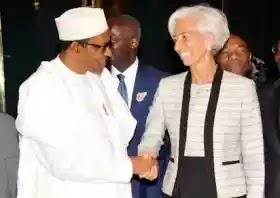
Consequent upon pressures and the open admonition by Senate President Bukola Saraki, and made more intense by the Managing Director of the International Monetary Fund, IMF, Ms Christine Lagarde, the Central Bank of Nigeria, CBN, may relax its policy on forex this week…
Sunday Vanguard learnt that apart from the call made in the open by the Senate President during last week’s audience with the IMF boss on the CBN, it has also been revealed that Lagarde pointed out, in unequivocal terms, the dangers of the continued forex policy instituted by the apex bank in the last eight months.
During the closed door sessions between the CBN governor, Godwin Emefiele, and Senate President Saraki on the one hand, and another with Ms Lagarde, there appeared to be a drift towards a consensual position on the restrictive forex policy.
Although Emefiele, according to a source at the private sessions, did not give away much regarding the apex bank’s possibility of a policy review, Sunday Vanguard was made to believe at the weekend that in the light of the expected visit from IMF economists this week, the policy may be relaxed.
The foreign exchange market witnessed introduction of several foreign exchange restrictions in 2015. The first notable restriction was the closure of official foreign exchange market (Retail Dutch Auction) on February 18, 2015 which translated to further devaluation of the naira to N197 per dollar from N165 per dollar.
The second notable restriction was the Exclusion of 41items from the official foreign exchange market.
Then, in August, the CBN banned acceptance of foreign currency deposit into domiciliary accounts.
In addition to the above, there was the reduction in the limit on usage of naira debit cards abroad. From $150,000 per annum the limit was pegged at $50,000 per annum per naira debit card. The daily cash withdrawal limit was pegged at $300 abroad.
During the year, the CBN banned banks from selling foreign exchange to the Bureau De Change (BDCs) while it revised the operating guidelines of BDCs, and in the process, banned any form of relationship of street hawkers of foreign currency (black market), and branch operations.
These restrictions coupled with dwindling foreign currency inflow due to continued decline in crude oil prices, as well as continued expectation of further devaluation of the naira, led to a consequential depreciation of the naira in the parallel market. The parallel market exchange rate of the naira rose from N179/N185 at the beginning of 2015, to close the year at N280 to a dollar.
And indeed, as a team of economists from the International Monetary Fund, IMF, are set to arrive Nigeria this week, there are indications that the executive and the legislative arms of government may have begun a process of horse trading with a view to making the 2016 Appropriation Bill, more implementable.
A finance ministry source told Sunday Vanguard that the discussions with the managing director of IMF, Mrs Christine Lagarde, who visited both arms of government last week has necessitated major amendments to the Bill, a development which has posed a challenge of how the Bill could be legally withdrawn from the two chambers of the legislature.



Leave a Reply